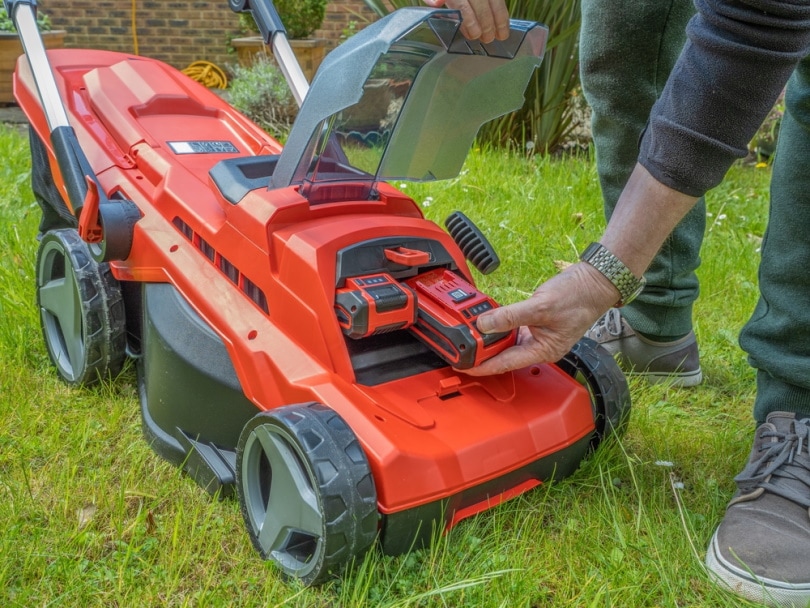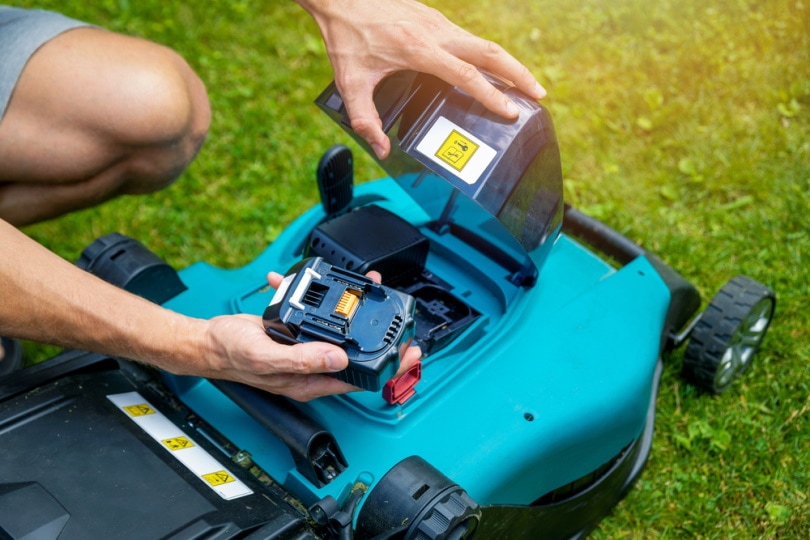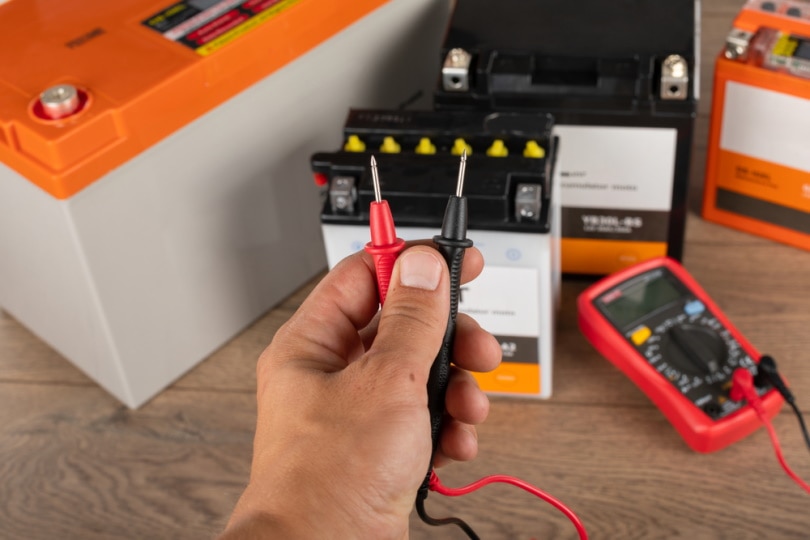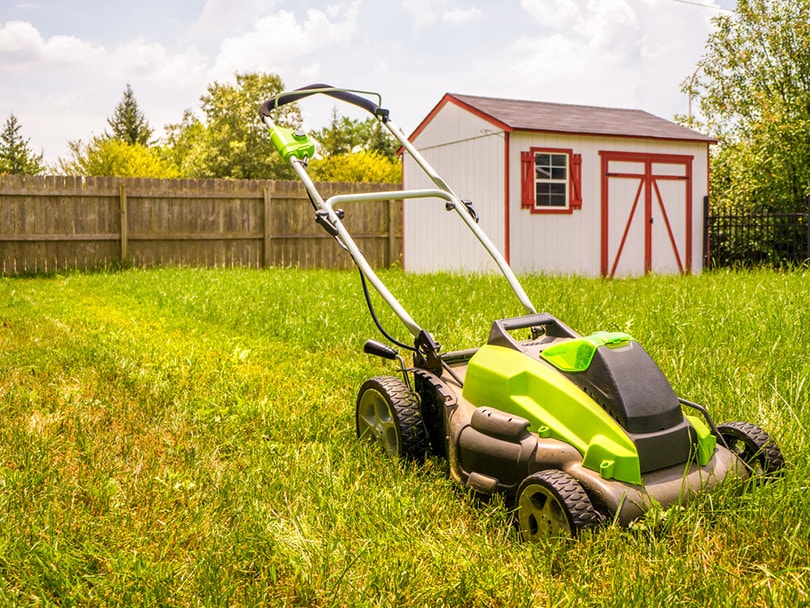How Long Do Lawn Mower Batteries Last? Types, Facts & FAQ
-
Pete Ortiz
- Last updated:

You have just bought your new lawn mower and are eagerly waiting to take it onto the grass and cut it to your desired level. However, in the back of your mind, you still have a lingering question about when you will need to change the battery. In general terms, a lawn mower battery will need replacement every 3–5 years, but it can be as little as 1 year depending on the battery type and usage.
There is good reason to worry about your lawn mower battery, as changing it can be hectic and may need you to dip into your wallet. You may also have other questions about this essential part of the machine.
In this article, we will look at lawn mower batteries and answer any lingering questions you may have about them.
Let’s check it out!
How Do Lawn Mower Batteries Work?
Lawn mower batteries work similarly to how you’d expect a car battery to work. The battery will power up the crank engine, which will trigger the recharge system and keep the mower powered while in use.
The battery recharge system comprises a voltage regulator and an alternator. If there is a power distribution problem, it is mostly associated with some failing components within the mower. This means the mower has to be repaired.

Lawn Mower Battery Life
Lawn mowers come with several battery cells made from different substances. If you replenish the battery entirely, it is worth noting how long it will take to require a full recharge. For a fully charged lawn mower, the battery life is around an hour, which may vary depending on the battery type and the work the mower is doing.
A newly bought lawn mower can have its battery working for at least 3–5 years before you have to change it, but this will vary depending on several factors.
One of the main factors is the type of battery. You should be aware of the type of battery you have in a lawn mower before making the purchase.
Riding Mower Battery vs. Push Mower Batteries
Another way to identify how long lawn mower batteries last is to differentiate between push and riding mowers. In making the distinction, we must consider whether the lawn mower uses gas or an electric motor.
For gas-powered lawn mowers, lead-acid batteries are used. For older models, the batteries are mostly 6-volt, but for the new mowers, you can expect to get a 12-volt battery.
For electric mowers, you can expect to find lithium-ion batteries, which will work with both cordless mowers and those with cords.
Types of Batteries Used in Lawn Mowers
Lithium-Ion Batteries
Lithium-ion batteries are a newer type of battery that works on a principle of transferring charges from the positive to the negative electrode, which ends up charging the battery.
Lithium-ion batteries last up to 5 years, which can also be described as 500 charging cycles. This means that you will need to replace the battery when the cycles lapse, even before the year is done.
The quality of the battery material will also affect the lifespan. The battery will get some extra properties for high-quality material, including faster charging, longer battery life, and increased energy storage.
Lithium-ion batteries will provide an average of 4 volts per cell, with a chance of increasing it to at least 72 volts per cell.
Lead Acid Batteries
As stated, these are the oldest kinds of batteries, but they cannot go to full capacity after being discharged. They last up to 200–300 cycles, translating to between 1–3 years.

What Affects the Lifespan of a Lawn Mower Battery?
Apart from the quality of the battery, other factors will influence how long the battery lasts, which all go towards the level of care you give to the battery.
Here are some tips to ensure the lawn mower battery lasts longer:
Charging
Charging is important, but there is such a thing as overcharging. This happens when a charger is not switched off after the battery is fully charged or using a battery charger that provides too much voltage at a time.
In the case of overcharging, there are a lot of potential damages, including a fire or explosion. Leaving a battery undercharged is also a potential problem for its lifespan. In the long run, working with undercharged batteries can reduce lifespan.
Instead, most people use a trickle charger, which can help extend the battery’s lifespan.
Temperature
The type of temperature the battery is exposed to can affect the lifespan. For one, leaving the battery on the lawn mower during winter can have the effect of discharging it or freezing it.
On the other hand, hot temperatures can have adverse effects on the battery, including the evaporation of its electrolyte solution, which will, in turn, reduce the battery’s capacity. This happens in temperatures of at least 100°F.

Maintenance and Storage
Apart from understanding the charging and temperature requirements, you should also be aware of the storage requirements. It is recommended that you remove and store the battery when not in use for prolonged periods.
For the maintenance part, you should clean the battery and ensure it is not in a humid or wet area. It would be best to cover the terminals, as dust and debris can affect them.
How to Maximize the Lifespan of the Battery
There are a few tips you can follow to ensure your lawn mower battery lasts longer, which include:
- Raising the Mower Height: While mowing, the higher the grass, the less moisture a lawn mower is exposed to. This reduces the extra force on the motor, resulting in longer battery life due to less drain while working.
- Use the Mower When the Battery Is Full: Using an undercharged lawn mower does not translate to a problem with mechanical components but will result in battery life problems.
- Don’t Use the Lawn Mower Too Early in the Morning: Moisture is not your lawn mower’s friend, so it is best to wait until the grass is dry to get to work.
- Avoid a Self-Propelled Feature: Self-propelled features result in increased energy consumption for the mower. Increased energy increases the load on batteries, which will reduce their lifespan.
- Avoid a Mulching Blade: The mulching blade is used for bagging mulch grass clippings, but while not in use for mulch, it will consume more power from the mower.
- Quality Batteries and Chargers: While purchasing battery replacements and chargers, go for high-quality versions. They may cost more, but they will be better in the long term.
- Batteries With Water: There are lawn mower batteries that come with water inside. The best thing is to check it regularly and refill it with distilled water when necessary. Every battery that comes with a water refill cap is always labeled clearly.
- Follow the Instructions: Also, follow the manual to ensure you are doing the right thing with the battery.
Frequently Asked Questions
How long do 40-volt lawn mower batteries last?
Most 40-volt lawn mowers use lithium-ion batteries. The battery can be recharged at least 500 times and will last between 3–5 years. It will typically last 40 minutes to 1 hour.
How long do 12-volt batteries last?
Most 12-volt batteries are made of lead acid. They last up to 4 years. Proper maintenance and care will count for a lot to ensure it goes for its full lifespan.
How can I tell if the lawn mower battery is bad?
If you want to tell whether the battery is okay, check for the voltage and ensure it is at least 12.7 direct current volts or more. Anything less is a sign of trouble. However, proper charging will return it to full capacity if no other faults are present.
Final Thoughts
In the end, there are a couple of factors to consider in ensuring your lawn mower batteries last long. However, every battery has its advantages and disadvantages, and choosing the right one for your mower may require some research. Always consider quality and pocket-friendly options and provide the proper maintenance for your battery to maximize its lifespan.
- See Also: 6 DIY Brick Driveway Plans
Featured Image Credit: Cliff Day, Shutterstock
Contents


